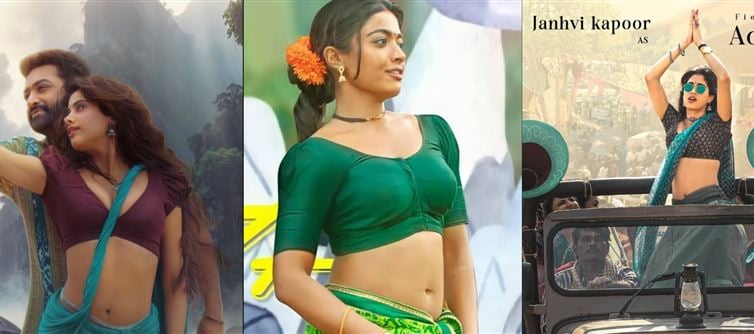
Somewhere between authenticity and allure, indian cinema lost its honesty.
Every time a film announces a rural backdrop, we already know what the heroine will look like—short blouse, low-draped saree, wet hair, and a permanent sheen of sweat. It’s not costume design anymore; it’s copy-paste seduction disguised as “realism.”
When janhvi kapoor steps into Devara or Peddi, or when rashmika flirts with grit in Pushpa 2, the story is no longer about the woman—it’s about how far the camera can push the male gaze and still call it “rustic charm.”
1. The ‘Village Girl’ Has Become a Template, Not a Character
Once upon a time, a rural setting meant raw, rooted storytelling. Today, it means the heroine must dress a certain way—like a curated fantasy of what “village simplicity” looks like under a ring light. Her accent changes, but her blouse doesn’t.
2. Costume Design Has Become a Shortcut for Character Depth
Instead of writing a woman who feels of the soil, filmmakers design her to look like she’s from it. The result? A visual shorthand for desire—earthy, dusky, drenched. It’s not representation; it’s reduction.
3. Janhvi Kapoor’s ‘Devara’ Look Isn’t Authentic—It’s Algorithmic
There’s a pattern, and it’s deliberate. When casting glamorous urban stars in rural roles, the industry compensates with overt sensuality. It’s not realism; it’s a retention strategy. “Make her relatable—but hot.” That’s the silent note behind the camera.
4. Rashmika’s pushpa 2 Aesthetic: From Fierce to Fetishized
What could have been a raw portrayal of survival turns into an aesthetic of exposure. The grime looks photo-ready. The skin glows under filtered light. Somewhere between costume and cleavage, the emotion got lost.
5. cinema Has Forgotten That Rural Doesn’t Mean Bare
In real villages, women wear layers—not just of fabric, but of experience, resilience, and agency. Yet on screen, we strip them—literally and metaphorically—until all that’s left is a glossy stereotype packaged as “tradition.”
6. When the Costume Speaks Louder Than the Character, the Film Has Failed
Art is supposed to reveal truth, not rehearse tropes. When the audience leaves remembering her waistline instead of her arc, that’s not storytelling—it’s marketing.
7. Filmmakers, Lead Better.
Representation is responsibility. A “village girl” isn’t your prop for rural realism. She’s a world waiting to be written with honesty. So stop dressing her up to sell your story—start listening to hers.
⚡ Closing Line
A rural backdrop isn’t a license to recycle the same costume, same gaze, and same fantasy. If cinema wants to call itself art, it needs to stop painting the same woman—and start seeing her.




 click and follow Indiaherald WhatsApp channel
click and follow Indiaherald WhatsApp channel